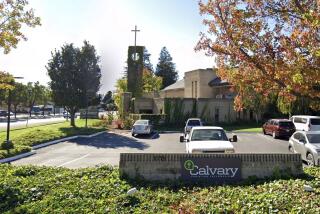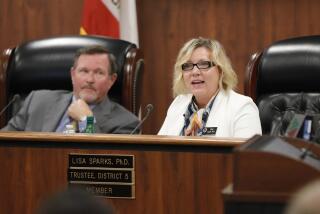Chula Vista church sues Newsom, San Diego County over coronavirus stay-at-home orders
The lawsuit filed says the governor’s stay-home orders ‘denigrated’ churches around the state; the suit follows a similar one filed by a congregation in Campo
- Share via
SAN DIEGO — Another church has filed a lawsuit in San Diego federal court alleging the stay-at-home orders of Gov. Gavin Newsom illegally deprive them of their religious freedom under the U.S. Constitution because the orders prohibit communal services.
The suit filed by the South Bay United Pentecostal Church of Chula Vista last week contends that the orders issued by Newsom and essentially duplicated by San Diego County officials discriminate against religious institutions. It seeks an injunction stopping enforcement of the ban on religious gatherings and a ruling saying the orders violate constitutional rights of speech, assembly and religious expression, among others.
The claims are similar to those filed by another San Diego County church, Abiding Place Ministries, in April, as well as lawsuits filed by other congregations around the state. A hearing is set for Friday in front of U.S. District Judge Cynthia Bashant.
The suit from the Chula Vista church takes aim at both the sweeping nature of the stay-at-home orders and the plans recently announced by Newsom to reopen the state incrementally.
The suit said that the initial orders issued in March by Newsom that shuttered many businesses, told residents to stay at home, closed public spaces and allowed only “essential” businesses and workers to function improperly disallowed religious gatherings.
The suit says California is one of eight states whose stay-at-home orders do not carve out an exception for churches, and charges that the order “criminalized all religious assembly and communal religious worship.”
The plans announced last week to gradually reopen the state in stages are no better, the suit says, because they say churches can’t reopen until the fourth and final stage, well after other entities and businesses are allowed to reopen.
“To be blunt, California’s present regime, which mandates that Californians who need the Spirit of Almighty God settle for the lesser spirits dispensed out of California’s liquor stores, is demeaning and denigrating to all persons of faith. Plaintiffs contend that, at least for their congregants, their assemblies are an ‘essential service’ and should therefore, because of fundamental First Amendment Protections, be treated equal to Stage 2 ‘essential’ businesses,” the lawsuit says.
Newsom’s order allows churches to use technology, such as live streaming on social media platforms or other means, to conduct worship services. Many congregations of all faiths have done so since the shutdown order.
Also, the state has recently changed the original order to allow drive-up services so long as social distancing is maintained. The county order also now allows that kind of communal worship.
Courts have recognized that state governments faced with public health emergencies can curtail constitutional rights with emergency measures, so long as the abridgment of those rights has some real or substantial connection to combating the crisis.
Bashant is also the judge on the Abiding Place lawsuit, and she earlier turned down a request for an injunction in that case from the church, which wanted to hold in-person services on Easter and had sued the county over its orders, which mirrored Newsom’s order.
“So the fact that the order bans gatherings, including those for purpose of religious services, I think it’s a reasonable and necessary restriction,” she said, according to a transcript of the hearing. “I think that to the extent that the order bans in-person gatherings, I think that has a real and reasonable relation to what is clearly a critical public health concern.”
Moran writes for the San Diego Union-Tribune.
More to Read
Sign up for Essential California
The most important California stories and recommendations in your inbox every morning.
You may occasionally receive promotional content from the Los Angeles Times.










